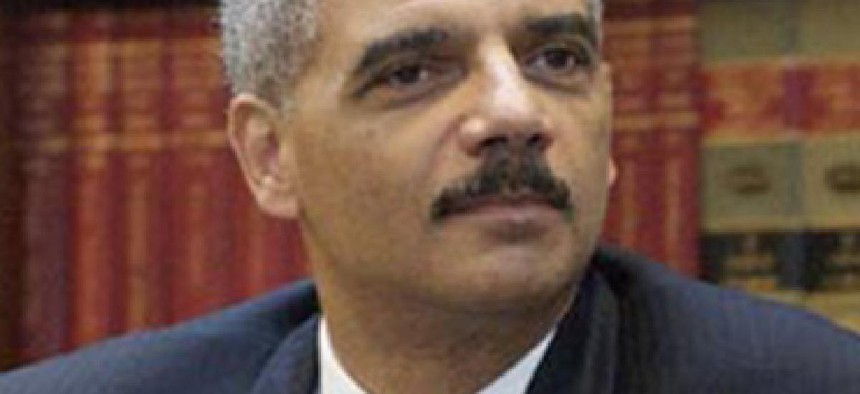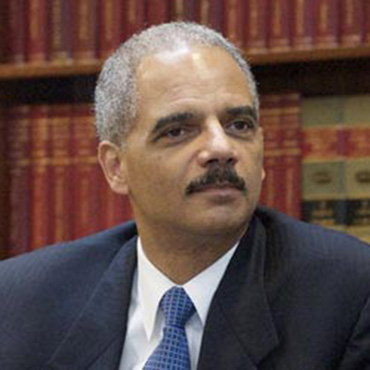Eric Holder’s IT legacy

The departing attorney general had no direct responsibility for information technology at DOJ, but the department dealt with multiple crises during his tenure, with mixed results.

Attorney General Eric Holder intends to step down after six years leading the Justice Department.
In his six years at the Justice Department, Attorney General Eric Holder has been a lightning rod on a variety of issues from immigration reform and the banking crisis to the fight against terrorism and his support the National Security Agency's data surveillance programs. Along with those controversial stances, he also led DOJ during a period when it adapted to an increasingly complex law enforcement and cyber IT environment.
While Holder, like other attorneys general, has had little direct influence on IT operations, a current Justice Department IT official commenting on background said strengthened portfolio management at DOJ and across the government have helped improve IT outcomes.
Leadership engagement, when it comes, is directed from the deputy attorney general, James Cole. Over the past six years, said the DOJ official, three CIOs during Holder’s tenure have taken a progressively more active role in modernizing the department’s IT operations, through stronger management under PortfolioStat and a more functional and active DOJ CIO Council, which brings together IT leadership from agency components. With the exception of FBI's troubled Sentinel case management system -- which started under a prior administration but has seen problems persist -- the number and visibility of IT issues under Holder's tenure have been relatively few, the official said.
A sense of urgency
Two IT developments stand out for Van Hitch, who was Justice Department CIO from 2002 to 2011.
The first was when WikiLeaks released a trove of stolen diplomatic cables. Hitch and his staff were charged by Holder with leading an upgrade of IT security. While Justice Department information wasn't compromised by WikiLeaks, Hitch told FCW the event "was a wake-up call to everybody" to get their own house in order, and the effort was aggressively managed.
"I think we did it faster than these initiatives typically go by quite a bit. We depended on support and visibility from the fourth and fifth floors to engender that kind of urgency," Hitch said. Top officials also strongly backed the implementation of the Unified Financial Management System, an $850 million overhaul to integrate systems at the FBI, the Bureau of Alcohol, Tobacco, Firearms and Explosives, the Drug Enforcement Administration, the Bureau of Prisons and other components into a single tool that standardizes business processes for procurement and financial reporting.
Overall, according to the Justice Department's 2014-2016 strategic management plan for IT issued in April, the agency's top IT operations managers have been wrestling with many of the same issues that other agencies have, from how to retain a skilled IT workforce to shrinking budgets.
"The pressure to deliver greater, more cost-effective IT capabilities to end users underscores the importance of being responsible stewards of the taxpayer dollars that fund our investments," Kevin Deeley, acting CIO in the department's Justice Management Division, Office of the Chief Information Officer, said in the plan.
"In partnership with the component bureaus, DOJ will execute the goals and objectives in this strategic plan in a way that not only optimizes our IT spending, but also improves the capabilities and services we deliver to the department’s employees and the public at large," he said.
Deeley said the goals for the OCIO's office from 2014 to 2016 include institutionalizing IT portfolio management, streamlining IT operations to serve customers, enhancing IT security, as well as expanding information sharing.
Facing the cyber threat
Despite Holder's traditional hands-off approach to agency IT, during his tenure he has had to deal with sinister emerging cyber threats both domestically and globally.
Just a day before news of Holder's departure broke, the Justice Department, the Department of Homeland Security, the National Security Council and Interpol Washington announced the latest information sharing and collaboration effort aimed at transnational crime. The effort includes formation of a dedicated Interpol Foreign Terrorist Fighter program that will leverage Interpol resources to combat crime that crosses international borders. Those resources, said the Justice Department, include Interpol's secure, encrypted communications system, its criminal and analytical databases and its system of advisory notices.
The Justice Department's domestic law enforcement arm, the FBI, has been grappling with an increasingly cunning, technically savvy international cybercriminal community aiming botnets and other electronic assaults at U.S. critical infrastructure providers as well as the general public.
For instance, at the end of August, the agency warned health care providers they had been targeted in what appeared to be one of the largest disclosed cyber attacks based on the Heartbleed Open SSL vulnerability that was uncovered last spring.
NEXT STORY: Who will be the next U.S. CIO?


